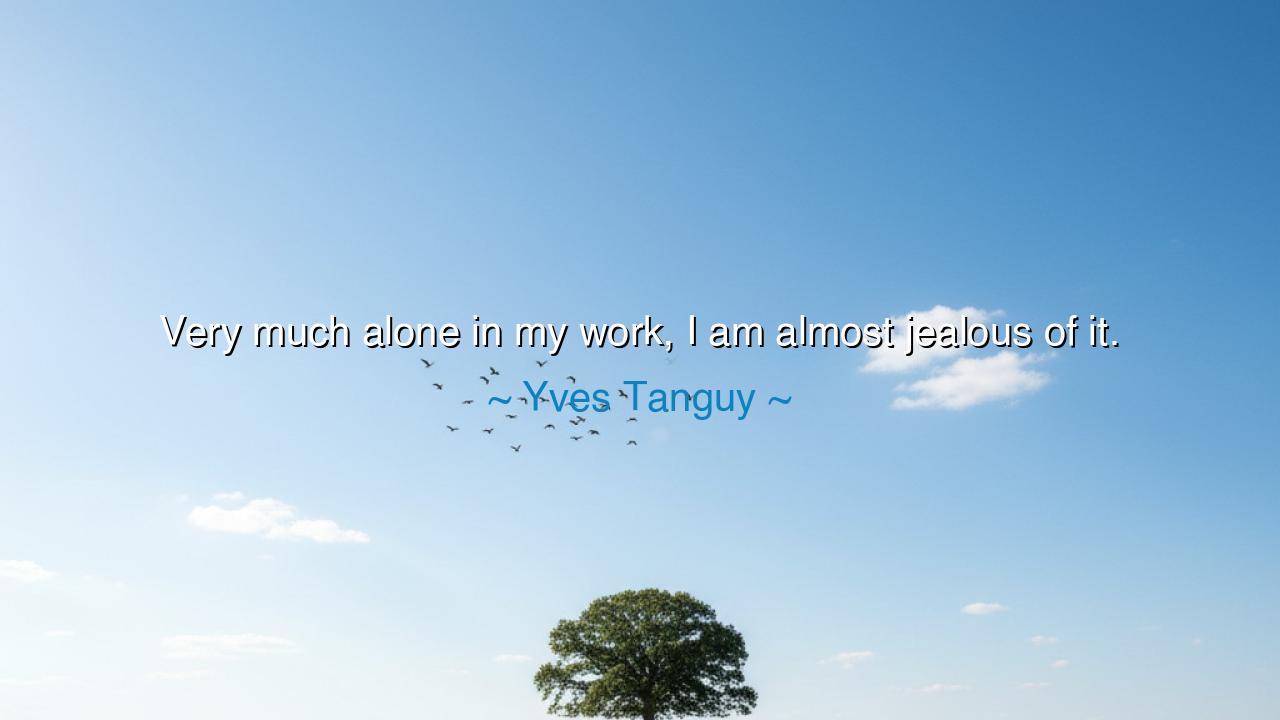
Very much alone in my work, I am almost jealous of it.






“Very much alone in my work, I am almost jealous of it.” — thus confessed Yves Tanguy, the surrealist painter whose canvases were dreamscapes of the subconscious, vast deserts of the mind where form and thought intertwined. In these few words, he opens to us the secret heart of the artist: the solitude of creation and the fierce intimacy one feels toward one’s own work. His statement is not of arrogance but of devotion — a love so profound that it becomes possessive, for to create is to give birth to something that belongs wholly to oneself, and yet must one day belong to the world.
The origin of this quote lies in Tanguy’s life as a painter of the surreal, a seeker of the invisible shapes of emotion. He was part of the great wave of surrealists — friends with Dalí, Miró, and Breton — yet he stood apart even from them. His art was a world he alone could enter. For Tanguy, creation was not collaboration but communion with the unknown. When he said, “I am almost jealous of my work,” he meant that the act of painting was not a mere craft but a sacred union between himself and the mysteries of his imagination. He was jealous of that union, for it was the one place where he was wholly free, wholly himself, untouched by the world’s intrusion.
In every artist’s heart lies this paradox: the need for solitude and the longing for understanding. Tanguy speaks from that paradox. Alone in his studio, he built worlds no one else could see — landscapes of fluid stone, endless horizons, objects suspended in silence. To outsiders, these were strange, even alien; to him, they were home. In his aloneness, he was not merely painting but conversing with his own soul. The jealousy he describes is the kind that lovers feel — the desire to keep something pure and unspoiled, away from the gaze of those who cannot understand it. For when one creates from the deepest places of the heart, the work becomes a mirror of the self — and who among us gives away such a mirror lightly?
History offers many such souls who have felt this sacred isolation. Emily Dickinson, who lived much of her life in the quiet of her Amherst home, once wrote, “The Soul selects her own Society — then — shuts the Door.” Like Tanguy, she guarded her solitude as a treasure, for it was the space where her truth could bloom. Her poems were her companions, her confidants, her secret joy — and though the world discovered her genius only after her death, she never regretted her withdrawal. For she, too, was jealous of her work, knowing that what she created in silence was more eternal than the applause of the crowd.
But this jealousy, rightly understood, is not possessive in the worldly sense. It is a reverence for the inner life — a recognition that creation demands loyalty, discipline, and sacrifice. The artist must guard his solitude as a warrior guards his armor, for it is from that solitude that beauty is born. When Tanguy speaks of being alone in his work, he is not lamenting loneliness, but honoring it. He teaches us that solitude is not emptiness; it is the temple where ideas are shaped into form. And jealousy, in this sense, is the fire that keeps that temple sacred — the refusal to let distraction or compromise profane it.
Yet there is also a warning in his words. To be too jealous of one’s work is to risk imprisonment within it. The artist must love the creation deeply but not worship it; he must be its master, not its slave. Tanguy’s solitude gave birth to brilliance, but it also isolated him from the warmth of human connection. Many creators — painters, poets, scientists alike — have walked that same narrow path, torn between their devotion to the work and the longing to belong. It is a noble struggle, for all great creation comes at the price of separation, and yet that very separation yields the gifts that illuminate the world.
The lesson, then, is this: treasure the solitude that allows your soul to speak, and guard it fiercely — but do not let it consume you. When you labor in your craft, whether in art, study, or service, love it with your whole being. Be jealous of your purpose, for it is sacred, but remember that its ultimate end is not possession but sharing. The artist’s task is not only to dream but to bring those dreams into the light, to offer them as gifts to others who may find in them reflections of their own hidden selves.
So let Yves Tanguy’s words echo through your heart: “Very much alone in my work, I am almost jealous of it.” Know that solitude is not a curse but a calling — the forge where creativity, wisdom, and authenticity are born. Enter that solitude with reverence, protect it from the noise of the world, and when your work is ready, release it with courage. For what is made in love, even if born in loneliness, will one day speak across the silence — and awaken the hearts of others who, too, have walked alone.






AAdministratorAdministrator
Welcome, honored guests. Please leave a comment, we will respond soon